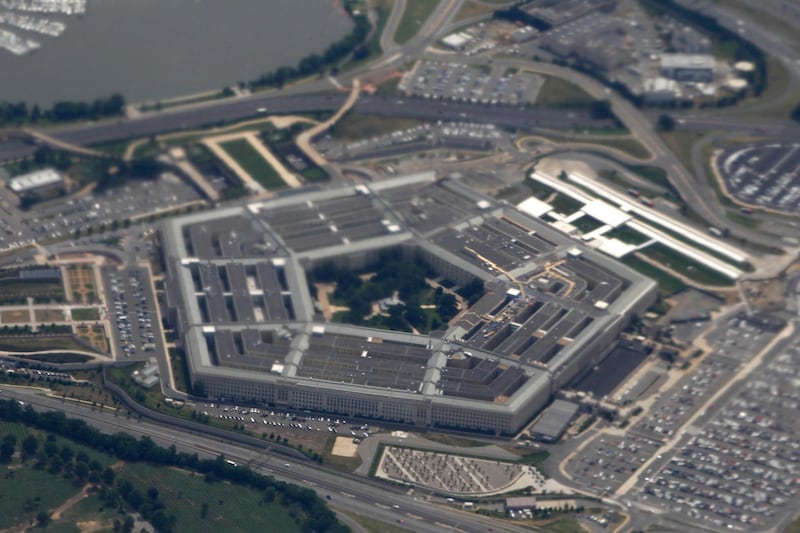In the latest twist in the fraught competition for the Department of Defense’s $10 billion (Dh36.72bn) cloud-computing project, the Pentagon Inspector General’s Office announced a new investigation into whether there have been improprieties or corruption in the contracting process thus far.
This inquiry, described to me as a very significant undertaking by Pentagon insiders, will complement a review already being conducted by new Secretary of Defense Mark Esper.
The cloud project is formally known as the Joint Enterprise Defense Infrastructure or, in a nod to Star Wars geeks, Jedi. It would provide a single managerial system and a single repository for storage of the department's incomprehensibly vast data streams. As the controversy hit, the contract was reportedly about to be awarded, with the final competitors being Amazon Web Services (the heavy, heavy favourite) and Microsoft.
The twin investigations were spurred by pressure from three sources: disgruntled competitors who felt they were out of the running; Congressional actors representing districts and states from where those competitors have a presence; and the Oval Office itself. President Donald Trump said in mid-July that he intended to review the Jedi contracting after receiving “tremendous complaints” about the process from “some of the great companies in the world”, including IBM, Microsoft and Oracle – each of which bid on the Jedi contract.
None of this, other than direct interference by the commander in chief, is particularly out of the ordinary for big defence acquisitions, given the byzantine procurement process in the Pentagon. As a newly selected one-star rear admiral in 2000, I was assigned to manage a complex agency-wide telecommunications contract that included creating a new constellation of satellites. By the time it was finally awarded, I had long transferred out of the Pentagon. And in 2013, as I was a grizzled four-star Admiral about to finish up my career, I was still wondering why the satellite constellation wasn’t yet fully operational. The short answer is that at the nexus of big money, political influence and uncertain technology, delays are a certainty.
All of this begs the questions of why the US military is pursuing this system, and how it can be brought on line rapidly – by whomever eventually wins the contract.
Jedi will be an absolutely vital part of America’s future warfighting capability, especially in the increasingly complex new 5G environment. At heart, the vast cloud would allow a much more efficient information-technology system, replacing the hodgepodge of thousands of hand-tooled, inefficient networks that exist today. This is especially critical for the military, where so many personnel transfer every two to three years, often taking with them a hands-on knowledge of an individual network or complex of software. For a vast organisation like the Department of Defense - the largest “company” in the world – Jedi’s efficiency at scale will be crucial to optimising expensive resources and operating efficiently.
It’s not just about efficiency, though: Jedi should vastly improve resiliency and security. Instead of individual networks and organisations backing up their information locally, everything is stored in a much more defendable cloud structure - just as your personal data and photographs likely exist in the Microsoft or Apple clouds today. The data can be seamlessly transferred, even in the intense crucible of combat. Cybersecurity experts tell us that there is great strength in reducing the number of individual portals that can be attacked and overcome; streamlining and unifying the defenses of the entire department make sense. This reduction of “threat surfaces” is crucial.
Finally, from an operator’s perspective, there is great allure in one-stop shopping to stream data (a sort of military Netflix,), to record and store it, to create simple systems to “patch” software, and to build an infrastructure that permits constant monitoring of the entire department’s networks. Lieutenant General Jack Shanahan, head of the Pentagon’s Artificial Intelligence Center, commented recently on the operational capabilities necessary for the emerging era of great power competition, with China in particular.
“Imagine the speed of operations in a fight in the Pacific, where you just do not have time to figure out, ‘How do I get my data, clean my data, move it from point A to point B.’” Lt Gen Shanahan said. “If I’m a warfighter, I want as much data as you could possibly give me. Let my algorithms sort through it at machine speed. It’s really hard for me to do that without an enterprise cloud solution.” His comments were echoed by the department’s chief information officer, Dana Deasy, in a rare on-the-record co-briefing to the press they held last week.
In order to move quickly to find efficiencies, create new resiliency, and provide a single point of contact for all IT operations, the Department of Defense needs to thoroughly but quickly complete these investigations. If there are real instances of malfeasance, they should be uncovered and the perpetrators punished forthwith. Frankly, Mr Esper has an unattractive set of options, including starting the competition over; pressing forward to award despite the external pressure; or searching for some middle ground that may satisfy nobody. Whether he can power through all the sand in the gears here will be the first test of his leadership abilities, and will be among the most important he will face.
In the likely scenario that all this smoke reveals not much fire but rather disgruntled competitors and political angst (and a strong component of anti-Amazon influence from the White House, where Amazon founder and Washington Post owner Jeff Bezos is despised), Mr Esper should press through to a contract award as soon as is legally appropriate. Warfighting in the 21st century will be "brain on brain" combat and a large, singular cloud structure is the grey matter the US military needs.
Bloomberg







